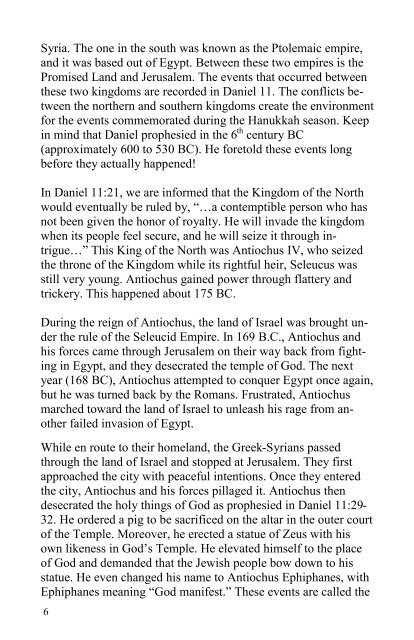Hanukkah and Purim
7XmCzUNYs
7XmCzUNYs
You also want an ePaper? Increase the reach of your titles
YUMPU automatically turns print PDFs into web optimized ePapers that Google loves.
Syria. The one in the south was known as the Ptolemaic empire,<br />
<strong>and</strong> it was based out of Egypt. Between these two empires is the<br />
Promised L<strong>and</strong> <strong>and</strong> Jerusalem. The events that occurred between<br />
these two kingdoms are recorded in Daniel 11. The conflicts between<br />
the northern <strong>and</strong> southern kingdoms create the environment<br />
for the events commemorated during the <strong>Hanukkah</strong> season. Keep<br />
in mind that Daniel prophesied in the 6 th century BC<br />
(approximately 600 to 530 BC). He foretold these events long<br />
before they actually happened!<br />
In Daniel 11:21, we are informed that the Kingdom of the North<br />
would eventually be ruled by, “…a contemptible person who has<br />
not been given the honor of royalty. He will invade the kingdom<br />
when its people feel secure, <strong>and</strong> he will seize it through intrigue…”<br />
This King of the North was Antiochus IV, who seized<br />
the throne of the Kingdom while its rightful heir, Seleucus was<br />
still very young. Antiochus gained power through flattery <strong>and</strong><br />
trickery. This happened about 175 BC.<br />
During the reign of Antiochus, the l<strong>and</strong> of Israel was brought under<br />
the rule of the Seleucid Empire. In 169 B.C., Antiochus <strong>and</strong><br />
his forces came through Jerusalem on their way back from fighting<br />
in Egypt, <strong>and</strong> they desecrated the temple of God. The next<br />
year (168 BC), Antiochus attempted to conquer Egypt once again,<br />
but he was turned back by the Romans. Frustrated, Antiochus<br />
marched toward the l<strong>and</strong> of Israel to unleash his rage from another<br />
failed invasion of Egypt.<br />
While en route to their homel<strong>and</strong>, the Greek-Syrians passed<br />
through the l<strong>and</strong> of Israel <strong>and</strong> stopped at Jerusalem. They first<br />
approached the city with peaceful intentions. Once they entered<br />
the city, Antiochus <strong>and</strong> his forces pillaged it. Antiochus then<br />
desecrated the holy things of God as prophesied in Daniel 11:29-<br />
32. He ordered a pig to be sacrificed on the altar in the outer court<br />
of the Temple. Moreover, he erected a statue of Zeus with his<br />
own likeness in God’s Temple. He elevated himself to the place<br />
of God <strong>and</strong> dem<strong>and</strong>ed that the Jewish people bow down to his<br />
statue. He even changed his name to Antiochus Ephiphanes, with<br />
Ephiphanes meaning “God manifest.” These events are called the<br />
6


